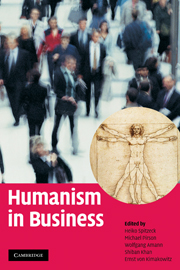Book contents
- Frontmatter
- Contents
- List of figures
- List of tables
- List of editors and contributors
- Acknowledgements
- Humanistic Management Network: paving the way towards a life-serving economy
- Introduction
- Part 1 Philosophic-historical grounding of humanism
- Part 2 Towards an integration of humanism and business on a systems level
- 8 Towards a civilized market economy: economic citizenship rights and responsibilities in service of a humane society
- 9 Development as freedom: individual freedom as a social commitment
- 10 On corporate responsibility for human rights
- 11 The value shift: merging social and financial imperatives
- 12 The ugly side of capitalism: what the young generation needs to combat
- Part 3 Humanistic management
- Part 4 The individual as a change agent for a humane business society
- Index
- References
9 - Development as freedom: individual freedom as a social commitment
Published online by Cambridge University Press: 25 January 2011
- Frontmatter
- Contents
- List of figures
- List of tables
- List of editors and contributors
- Acknowledgements
- Humanistic Management Network: paving the way towards a life-serving economy
- Introduction
- Part 1 Philosophic-historical grounding of humanism
- Part 2 Towards an integration of humanism and business on a systems level
- 8 Towards a civilized market economy: economic citizenship rights and responsibilities in service of a humane society
- 9 Development as freedom: individual freedom as a social commitment
- 10 On corporate responsibility for human rights
- 11 The value shift: merging social and financial imperatives
- 12 The ugly side of capitalism: what the young generation needs to combat
- Part 3 Humanistic management
- Part 4 The individual as a change agent for a humane business society
- Index
- References
Summary
Bertrand Russell, who was a firm atheist, was once asked what he would do if, following his death, he were to encounter God after all. Russell is supposed to have answered, “I will ask him: God Almighty, why did you give so little evidence of your existence?” Certainly the appalling world in which we live does not – at least on the surface – look like one in which an all-powerful benevolence is having its way. It is hard to understand how a compassionate world order can include so many people afflicted by acute misery, persistent hunger, and deprived and desperate lives, and why millions of innocent children have to die each year from lack of food, or medical attention, or social care.
This issue, of course, is not new, and it has been a subject of some discussion among theologians. The argument that God has reasons to want us to deal with these matters ourselves has had considerable intellectual support. As a nonreligious person, I am not in a position to assess the theological merits of this argument. But I can appreciate the force of the claim that people themselves must have responsibility for the development and change of the world in which they live. One does not have to be either devout or nondevout to accept this basic connection. As people who live – in a broad sense – together, we cannot escape the thought that the terrible occurrences that we see around us are quintessentially our problems.
- Type
- Chapter
- Information
- Humanism in Business , pp. 156 - 174Publisher: Cambridge University PressPrint publication year: 2009
References
- 4
- Cited by



